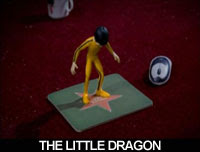Boston Underground Film Festival ’23: Sick of Myself
Syk pike
***½/****
starring Kristine Kujath Thorp, Eirik Sæther, Fanny Vaager
written and directed by Kristoffer Borgli
The Boston Underground Film Festival runs from March 22-March 26, 2023. Click here for more info.
by Walter Chaw Effectively the Ruben Östlund film that got away, Kristoffer Borgli’s acerbic Sick of Myself (and I can’t say the title without singing it to the tune of the Matthew Sweet anthem of self-loathing) skewers the cult of victimhood that runs parallel to any progressive social awakening, muddying the waters to such an extent that the language of tolerance becomes weaponized, and true gains come clouded with apologies and equivocations. One step forward, 80 years’ worth of steps back. A scene late in Sick of Myself between a poisonous narcissist and the friend and journalist trying to make sense of it all has the malignant party saying they’re the real victim of their own absurd machinations, because, given a choice, no one would ask to be a psychopath. It’s funny because it’s familiar: how self-pity is the easier sensation to bear over shame. And it’s familiar because there isn’t even anything like the illusion of accountability left in this world. The worst of us, given an unprecedented platform to do harm, will never admit to anything like fault or suffer anything like consequences.


